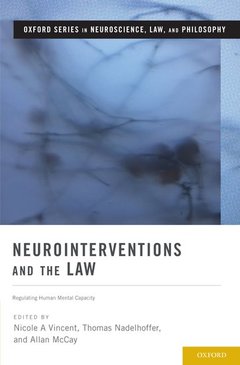Description
Neurointerventions and the Law
Regulating Human Mental Capacity
Oxford Series in Neuroscience, Law, and Philosophy Series
Language: English
Publication date: 07-2020
464 p. · 23.4x15.6 cm · Hardback
464 p. · 23.4x15.6 cm · Hardback
Description
/li>Biography
/li>
This volume makes a contribution to the field of neurolaw by investigating issues raised by the development, use, and regulation of neurointerventions. The broad range of topics covered in these chapters reflects neurolaw's growing social import, and its rapid expansion as an academic field of inquiry. Some authors investigate the criminal justice system's use of neurointerventions to make accused defendants fit for trial, to help reform convicted offenders, or to make condemned inmates sane enough for execution, while others interrogate the use, regulation, and social impact of cognitive enhancement medications and devices. Issues raised by neurointervention-based gay conversion "therapy", efficacy and safety of specific neurointervention methods, legitimacy of their use and regulation, and their implications for authenticity, identity, and responsibility are among the other topics investigated. Dwelling on neurointerventions also highlights tacit assumptions about human nature that have important implications for jurisprudence. For all we know, at present such things as people's capacity to feel pain, their sexuality, and the dictates of their conscience, are unalterable. But neurointerventions could hypothetically turn such constants into variables. The increasing malleability of human nature means that analytic jurisprudential claims (true in virtue of meanings of jurisprudential concepts) must be distinguished from synthetic jurisprudential claims (contingent on what humans are actually like). Looking at the law through the lens of neurointerventions thus also highlights the growing need for a new distinction ? between analytic jurisprudence and synthetic jurisprudence ? to tackle issues that increasingly malleable humans will face when they encounter novel opportunities and challenges.
Nicole A Vincent, PhD is a Senior Lecturer in the Faculty of Transdisciplinary Innovation at University of Technology Sydney. She is also an Honorary Fellow in the Department of Philosophy at Macquarie University, and an Affiliate Member of its Centre for Agency, Values, and Ethics. She has published widely in neuroethics, neurolaw, philosophy of tort and criminal law, ethics, and political philosophy. Her current work also engages with topics in the philosophy and ethics of emerging technologies, futures, feminism, and gender studies. Thomas Nadelhoffer, PhD is an Associate Professor in the Philosophy Department at the College of Charleston, an affiliate member of the psychology department, and a roster faculty member in the neuroscience program. He has edited The Future of Punishment (Oxford University Press 2013) and co-edited Moral Psychology: Historical and Contemporary Readings (Wiley-Blackwell 2010). He has also published widely on topics ranging from action theory, free will, moral psychology, neuroethics, criminal law, psychopathology, and punishment. Allan McCay, PhD teaches at the University of Sydney Foundation Program, and is a member of the Management Committee of the Julius Stone Institute of Jurisprudence at the University of Sydney Law School. He is also an Affiliate Member of the Centre for Agency, Values, and Ethics at Macquarie University. His research interests include neurolaw, free will and punishment, and legal and ethical issues related to emerging technologies. He co-edited Free Will and the Law: New Perspectives with Michael Sevel (Routledge 2019).
© 2024 LAVOISIER S.A.S.




